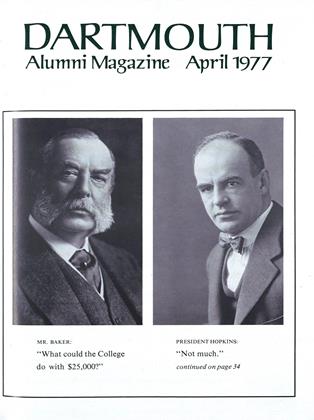As a young man Bernard D. Nossiter '47 discovered he could get free jazz records by writing reviews for a newspaper and he could pay for weekends at Wellesley by being the campus correspondent for the New York Times and the old Boston Post. Now, the man who was always delighted to discover hypocrisy in high places - and who couldn't wait to share the secret - sits in front of an old Olympia typewriter on the 13th floor of New Zealand House as the Washington Post's London correspondent.
His choice of a journalism career was not as carefree as all that. Nossiter, who went on to earn M.A. at Harvard after leaving Dartmouth, was trained as an economist and, he says, saw myself as a latter-day New Dealer and going to Washington to solve all the Problems. By the time he finished his work at Harvard, however, the Washington of the Truman-McCarthy investigations held little attraction and he gave journalism a second thought.
He spent a summer at the Worcester Telegram and joined the copy desk at the WallStreet Journal, only to be fired after an attempt to organize a guild unit. "It wasn't legal but it was all right," he says, "because I had another job at Fortune."
He stayed at Fortune for less than a year before moving on to the old New York World-Telegram & Sun, a Scripps-Howard paper with more than a dash of the Front Page atmosphere, the kind of paper wizened old newspapermen still muse about. "I wanted to work in New York City," he says, "and that paper was a marvelous place to work because of Bert McDonald." McDonald, a rough-and-tumble city editor who, Nossiter says, was "ashamed of being a Phi Beta Kappa at MIT," and Frank Kappler '36, his civilizing deputy, ran an exciting, if picaresque, newsroom. "It was fun, a great place for a young man," Nossiter says. "There I learned the rudiments of the trade."
After three years of exposing scandals (or, rather, exposing them until the paper's management intervened), Nossiter left New York for the Washington Post, where he became national economic correspondent. He spent another year at Harvard on a Nieman fellowship (and wrote his first book, The Myth Makers) before going overseas, first to Paris as the Post's European economic correspondent and then to India, where he earned the wrath of Indira Ghandi and where he wrote another book, Soft State. He returned to Washington as a national correspondent before he was given the London bureau five years ago.
 View Full Issue
View Full Issue
More From This Issue
-
 Feature
FeatureAffirmative Action
April 1977 By MARY ROSS -
 Feature
FeatureMr. Hopkins Builds a Library
April 1977 By CHARLES E. WIDMAyER -
 Feature
FeatureIf you spent the winter in Buffalo, Imagine This
April 1977 By THOMAS SHERRY -
 Feature
FeatureThe Road Not Taken
April 1977 By JOHN S. MAJOR -
 Article
ArticleBetween Seasons
April 1977 By JACK DEGANGE -
 Article
ArticleTopeka Takes On the Hun
April 1977 By NICK SANDOE '19







